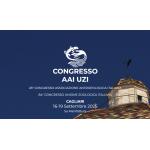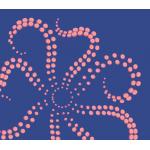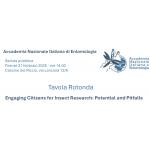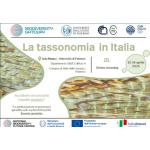2 International Training School: An integrated approach to marine invertebrate biodiversity: evolutionary and functional adaptations
OST ACTION 16203 - MARISTEM
– 2ndst International Training School
An integrated approach to marine invertebrate biodiversity:
evolutionary and functional adaptations
Location: Palazzo Grassi and Stazione Idrobiologica “U. D’Ancona”* - Chioggia (Venice)
(*member of MARS – European network of marine research institutes and stations)
https://www.biologia.unipd.it/dipartimento/sedi-e-strutture/chioggia/stazione-idrobiologica
September 9th -13th, 2019
– 2ndst International Training School
An integrated approach to marine invertebrate biodiversity:
evolutionary and functional adaptations
Location: Palazzo Grassi and Stazione Idrobiologica “U. D’Ancona”* - Chioggia (Venice)
(*member of MARS – European network of marine research institutes and stations)
https://www.biologia.unipd.it/dipartimento/sedi-e-strutture/chioggia/stazione-idrobiologica
September 9th -13th, 2019
DOWNLOAD BROCHURE
Aim
Invertebrates represent the largest component of biodiversity and the widest evolutionary adaptive radiation on our planet, with more than 2,000,000 morpho-species formally described (95% of the overall animal biodiversity). They include aquatic organisms with relatively simple body plans such as sponges or cnidarians as well as morphologically complex taxa, such as molluscs, echinoderms and protochordates. By investigating life cycles and functional adaptations of marine invertebrates, scientists can learn on the evolution of Metazoa. Moreover, many taxa have been established or are currently emerging as laboratory model systems, simple versions of more complex organisms, contributing to the elucidation of various biological problems. Remarkable examples goes back to experiments on phagocytosis in sea star larvae, the first studies on biological chimeras in corals, the importance of the sea urchin to understand the molecular basis of development, including the “gene regulatory networks” and the discovery of cyclins as molecular controls of cell proliferation, the studies on primitive immunity in colonial organisms (sponges, hydrozoans, corals, urochordates, bryozoans), the plasticity of development, the use of aquatic flatworms for regeneration studies, and the discovery of green fluorescent protein in cnidarians, among many others. Research on marine invertebrates led to some of the greatest scientific advances. Studies on squid biology led to the comprehension of the molecular basis of synapytic transmission; investigations on sea urchin were fundamental for the understanding of sexual reproduction and early development; polychaetes provided key information on the evolution and development of centralized nervous systems; cnidarians offered fundamental insights on aging, stem cell biology and the molecular mechanisms controlling cell differentiation; sponges, placozoans and ctenophora are groups for tracing back the evolution of multicellularity. Furthermore, marine invertebrates are considered an untapped source of new bioactive compounds.
In-depth knowledge of adaptive strategies and developmental patterns of marine invertebrates is mandatory for the comprehension of the organism-environment interactions, their intra-specific and inter-specific relationships, and the functioning of marine communities. The training school is organized in the framework of a joint agreement of academic cooperation among the Universities of Milan, Padua, Palermo, and Salento (Lecce) and sponsored by the COST European Programme “Maristem” coordinated by the Department of Biology of the University of Padua (IT), the Zoological Society of Italy (UZI) and the Italian Association of Developmental and Comparative Immunology SIICS-IADCI).The scientific themes will cover comparative analysis of main adaptive strategies across several invertebrate phyla to raise interest on invertebrate biology and evolution. Finally, this international school will provide the opportunity for exchanging students of different European universities and can be credited as a Master Course Program, acknowledged by 4 credits (ECTS) through a specific final verification test.
School structure
Lessons will be in English and will consist of lectures, field and laboratory activities and tutorials addressing morphology, anatomy, ecology, developmental biology (including eco-devo and evo-devo approaches) of selected marine invertebrate groups in the general framework of their reciprocal evolutionary relationships, with focus on their adaptive strategies to various environments, life cycle adjustments, environmental stress responses, and immunobiology.
Active participation will be essential as students will make observations on living invertebrates, carry on experimental bench work, analyse results, and discuss recent bibliography. In addition, communication skills will be developed, including informal interactions with instructors, collaborative work with other participants, oral presentation of their interests, written report describing the experiments and analysing their own results.
•Field work: The Chioggia location (on the south of the Venice Lagoon) is the teaching pole of the Department of Biology of the University of Padova, where the degree courses in Marine Biology are taught.
Palazzo Grassi’s rooms and laboratories (see map) will be at the school’s disposal for the occasion. Close to it there is also our small Marine Station and its boat will be useful for collecting specimens of animals, plankton.
•Practical work: Students will work on microscopes and dissecting microscopes throughout the course to carry on direct observations of features presented by lecturers.
Contents (Main taxa, Topics, Models)
• Porifera, Cnidaria, Xenacoelamorpha, Platyhelminthes, Rotifera, Echinodermata, Hemichordata, Tunicata.
• Morphological and functional adaptations (sensory-motor integration, respiration, nutrition, locomotion and reproduction), life cycles and life histories.
• Regeneration, aging, reverse development, stem cells.
• Stress responses, immunobiology, self-recognition, chimerism.
Journal clubs setting up: presentations of some recent relevant papers on invertebrate biology with particular reference to stem cells. Participants will be provided with papers and, gathered in 4-5 groups, will give a presentation illustrating the novelties of the papers.
The draft program will be sent soon.
This course has been endorsed by the Zoological Society of Italy and the Italian Association of developmental and Comparative Immunology
Contributors and lecturers
Loriano Ballarin
Department of Biology, University of Padova, Padova, Italy.
E-mail: loriano.ballarin@unipd.it
Eugene Berezikov
European Research Institute for the Biology of Aging, University of Groningen, Nederland
E-mail: e.berezikov@umcg.nl
Matteo Cammarata
Department of Earth and Sea Science, University of Palermo, Italy
E-mal: matteo.cammarata@unipa.it
Alexander Ereskowsky
Institut Méditerranéen de Biodiversité et d’Ecologie marine et continentale (IMBE)
UMR n°7263 CNRS, Aix Marseille Université, IRD, Avignon Université Station Marine d’Endoume
E-mail: alexander.ereskovsky@imbe.fr
Cinzia Ferrario
Department of Political and Environmental Sciences, University of Milano, Milano, Italy
Email: cinzia89.ferrario@alice.it
Diego Fontaneto
Consiglio Nazionale delle Ricerche, Istituto per lo Studio degli Ecosistemi, Verbania Pallanza, Italy
E-mail: d.fontaneto@ise.cnr.it
Fabio Gasparini
Department of Biology, University of Padova, Padova, Italy.
E-mail: fabio.gasparini@unipd.it
Lucia Manni
Department of Biology, University of Padova, Padova, Italy.
E-mail: lucia.mannj@unipd.it
Pedro Martinez
Departament de Genetica, Universitat de Barcelona, Barcelona, Spain
E-mail: pedro.martinez@ub.edu
Maria Giovanna Parisi
Department of Earth and Sea Science, University of Palermo, Italy
E-mail: mariagiovanna.parisi@unipa.it
Roberta Pennati
Department of Political and Environmental Sciences, Milano, Italy
E-mail: roberta.pennati@unimi.it
Stefano Piraino
Department of Biological and Environmental Science and Technology (DISTEBA), Salento University, Lecce, Italy
E-mail: stefano.piraino@unisalento.it
Buki Rinkevich
Israel Oceanography and Limnological Research, National Institute of Oceanography, Haifa 31080, Israel
E-mail: buki@ocean.org.il
Ildiko ML Somorjai
School of Biology, University of St Andrews, Scotland, UK
E-mail: imls@st-andrews.ac.uk
Michela Sugni
Department of Political and Environmental Sciences, University of Milano, Milano, Italy
E-mail: michela.sugni@unimi.it
How to reach Chioggia
Venue
Chioggia is a picturesque town on the south of the Venice Lagoon (https://en.wikipedia.org/wiki/Chioggia). It is connected to Venice by regular buses (quickest way) and by boats. There is a direct connection to the airport of Venice
By plane
The nearest international airport is Venice Marco Polo.
From there, there are regular shuttle buses to Venice Piazzale Roma (30-min trip, bus nr. 5 and nr. 35 every 10’ and cost € 8 per ride), where the buses to Chioggia leave (1-h trip to Chioggia).
There is also a direct bus service from Venice airport to Chioggia (90-min trip; at € 6.40). The provider is Arriva Veneto (www.arrivaveneto.it), bus nr. 80, stop at Chioggia Campo Marconi. Please notice that buses are not regular on Sundays.
Some low-cost companies reach the airport of Venice Treviso. From there, regular buses to Venice Piazzale Roma (1-h trip) are available: www.atvo.it, buses every 30’ at € 22 return ride.
From Piazzale Roma change bus to Chioggia. Please notice that buses are not regular on Sundays.
In Chioggia the bus stop is located immediately out of the historical town centre , so you have to walk 5-10 min to reach the accommodation site of Palazzo Grassi (see map1).
By car
Chioggia is connected to the “Romea” road (SS3209).
It is not possible to find public parking on Chioggia. There is a big parking (payment is required) in the “Isola dell’Unione”, the island between Chioggia and Sottomarina (see map2). Some parking places for small cars are available at Palazzo Grassi. Please, contact the organiser in case you are planning to come by car.
Financial support:
For the financial support please refer to the Financial rules which will be sent separately to final school Trainers and Trainees.
Please contact our admin. for any question or doubt on it before booking your journey.
Local Organiser of the event:
University of Padua – Department of Biology
Via Ugo Bassi 58/b – I - 35131 Padova
Prof. Loriano Ballarin
Email: loriano.ballarin@unipd.it
Phone (office) +39 049 8276197
Phone 2 (mobile) +39 328 8345580
For admin. questions please contact:
Luisa Talamo
Email: luisa.talamo@unipd.it
Phone (office hr) +39 049 827 6242
– 2nd International Summer School –
September 9-13, 2019
An integrated approach to marine invertebrate biodiversity:
evolutionary and functional adaptations
Registration and deadline
Deadline for registration August, 31st, 2019
Send applications to: loriano.ballarin@unipd.it, luisa.talamo@unipd.it
Applications should include full department address, phone, fax, e-mail (see form below) together with a short curriculum vitae, description of the applicant’s current research interest, and a letter of presentation written by a tutor from applicant’s home institution.
Applications will be evaluated and all applicants will be notified by e-mail.
Maximum number of trainees: 15.
According to the COST rules, trainees from countries participating in the COST Action 16203 – MARISTEM will be preferentially selected.
Trainees should be engaged in an official research programme as a PhD Student or postdoctoral fellow or employed by, or affiliated to, an institution, organisation or legal entity which has within its remit a clear association with performing research.
Once selected, trainees must register for an e-COST profile at https://e-services.cost.eu.
COST will cover the expenses of the materials and of lunches/coffee break. A support to travel and accommodation expenses will be given to participants of the COST countries in the form of a grant of 290 euros. A special price of 25 euros per night has been agreed at the Domus Clugiae guesthouse, in Chioggia, for trainees, in double or triple rooms, breakfast included.






